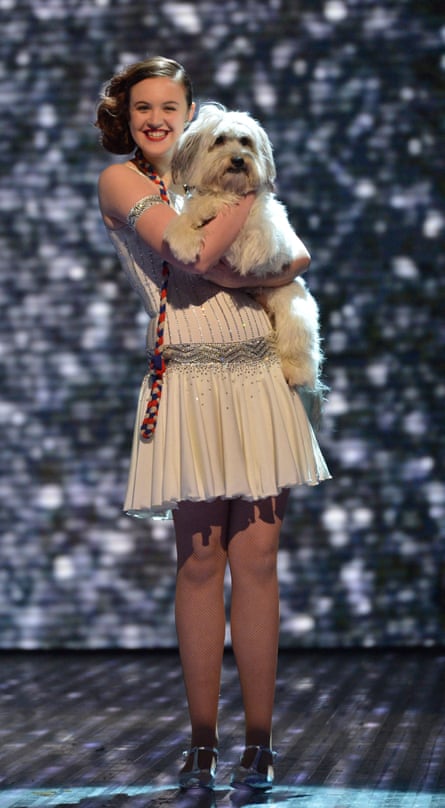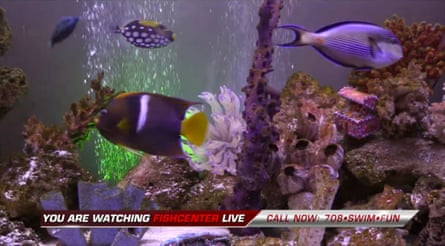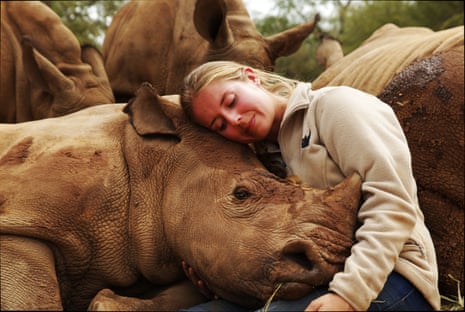Television schedules often seem to have been constructed by picking titles out of a hat in the dark. Next week, though, ITV has a peak-time double that belong together like, well, owner and dog.
Wednesday’s latest edition of Long Lost Family, the Bafta award-winning show that seeks to reunite people with their relatives, is preceded by Wild Animal Reunions, which promises to “follow animal keepers and caregivers” as they seek to restore contact with creatures who they looked after before they were released into the wild.
ITV advises that the show is not currently in a finished state for preview – perhaps some of the special guests proved hard to track down – but the opening episode promises to include a rendezvous between orphan elephants and the zookeepers who raised them, and a sequence in which a scientist who has worked with black bears puts his theory of species affinity to the test.
In common with much contemporary TV, the series is tailgating web traffic: more than 100 million people have watched clips of a man being reunited with the lion he bought from Harrods and returned to nature. The show also, though, has strong links with traditional television. A publicity picture shows a woman cuddling a chimp, an image that invokes one of the single most famous moments of British television: when Sir David Attenborough plays with a baby and mother gorilla in Rwanda. A second encounter between Sir David and his friends would be the ultimate moment for Wild Animal Reunions, although the age of both participants would probably rule against it.

What’s most striking about Wild Animal Reunions, though, is that it shows the increasing territorial footprint of beast-TV. Programmes about long treasured meetings are one of the network’s hottest current genres – former bandmates and TV co-stars were recently brought together in Where Are They Now? The Reunions – and now four-footed performers have a toe-hold in this field as well.
The talent-show genre long ago went to the dogs, starting with the pooch that could say “sausages” on Esther Rantzen’s That’s Life and the 80s American show Those Amazing Animals. More recently, the victories in Britain’s Got Talent of owner-and-dog acts Ashleigh and Pudsey and Jules O’Dwyer and Matisse threatened to make human wannabes feel at a disadvantage. However, the controversy over Matisse’s use of a double for one of his signature stunts was a warning to non-human performers that they are as subject to the Ofcom guidelines as any other screen star. Many quadruped game shows have also been attempted, in which the star prize should ideally be a bone or a bowl of water: the most memorable of which was Pets Win Prizes.
Although it’s rare for a dog to take the lead character in a drama, there are more than enough supporting stars for a canine branch of Equity. The success of Poldark on BBC1 transformed the casting chances of its human stars – Aidan Turner has been spoken of as a possible James Bond – but also of its standout animal character. Barley, the lurcher cross who plays Demelza Poldark’s canine companion, Garrick, has recently appeared alongside (and sometimes behind) Sophie Okonedo in the police series Undercover, and has also shot Beauty and the Beast with Emma Watson and the new JK Rowling movie, Fantastic Beasts.
Crime fiction – the most popular form of TV drama – has been relatively resistant to dog detectives for obvious reasons of dialogue and on-set hygiene. However, Inspector Rex, a series about a police dog who had better deductive powers than his handlers, was a long-running hit in Austria, and Rin Tin Tin: K-9 Cop was a similar Canadian franchise. In both those shows, the mutts are Holmes to the Watson of their human sidekicks.
Unsurprisingly, given the strong anthropomorphic impulse in the world since Walt Disney, most creature TV has presented the protagonists as cute and cuddly. But there have been documentary exposés, such as When Animals Attack, and When Good Pets Go Bad.
With animals having moved far beyond their expected television territory of children’s shows, wildlife documentaries and vet series, the obvious question is what genre can they put their paw print on next?

Perhaps surprisingly, the non-human talkshow (insert own Piers Morgan jokes) has already been attempted in various forms, including FishCenter Live, on the Adult Swim cable channel, a content provider new to me. Ambitiously, this is a phone-in show, although disappointingly, the fish don’t take the calls, but swim in tanks that surround the presenters.
So perhaps the next challenge is an Animal Question Time – although, in an edition with a farmyard panel, David Dimbleby might endure less barking, whining and bullshitting than he does from the usual human crew.

Comments (…)
Sign in or create your Guardian account to join the discussion